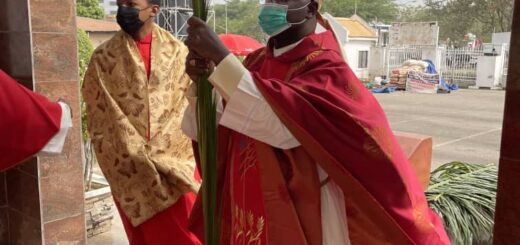The second coming of Jesus
by ARCH BISHOP · November 14, 2021
THIRTY THIRD SUNDAY, YEAR B, ST. MULUMBA’S PARISH, IGU, NOVEMBER 14, 2021, HOMILY BY ARCHBISHOP I. A. KAIGAMA
Readings: Dan. 12: 1-3; Ps. 15(16): 5, 8-11; Heb. 10: 11-14, 18; Mk. 13: 24-32
As the Church’s liturgical year gradually draws to a close, the readings of today’s Mass especially, the first reading and the Gospel remind us of the end of time. The book of Ecclesiastes puts it succinctly, “there is time for everything” (Eccl. 3:1) and the Gospel pays attention to the second coming of Jesus with particular emphasis on our readiness to receive or welcome Him. In the Creed we say, Jesus “will come again in glory to judge the living and the dead and His kingdom will have no end”. Those asleep in death will be raised; the righteous to everlasting life to shine as bright as the stars for all eternity (cf. Dan. 12:3) and the unrighteous to shame and everlasting contempt.
Our second reading from the letter to the Hebrews highlights the efficacy of the sacrifice of Christ for our salvation and the need to live gratefully by preparing for His second coming in our individual lives. Before we go further to the things that will come, I wish to briefly focus on your parish, St. Mulumba’s Parish, Igu. I looked forward to visiting your parish and by God’s design, it is now a reality. By divine providence, my visit is coming at a time when you are celebrating 25 years as a parish, within the same period of the 40th anniversary of the ecclesiastical jurisdiction of Abuja. You have come a long way and by the grace of God, your parish community will continue to grow stronger in the faith and record more spiritual and pastoral successes.
Back to the things to come: The Book of Daniel from which our first reading is taken forms part of what is called “apocalyptic literature” in the Old Testament. It makes use of several imageries, signs, symbols, and numbers. For example, the beast refers to the evil emperor; the number 666 refers to what is anti-god and antichrist, all that is in opposition to the one true God; gold, silver, copper, bronze, iron, clay, etc. refer to the different kingdoms at the time.
The authors used a coded language to narrate the experiences of God’s people in exile during the reign of the Babylonians and the fierce persecution under Antiochus Epiphanes. They wrote to give hope to the people of God, and also to answer the age-long question about life after death, providing consolation to those who had lost their loved ones.
In the Gospel reading, Jesus uses the same apocalyptic tone and imageries about His second coming, together with His angels with great power and glory. While many people still interpret this prediction of Jesus in line with the fall of Jerusalem, no one can dispute its profound connection with His second coming which is both far and imminent. The emphasis here is not on time and date but on how we must prepare ourselves for the coming of the kingship of Christ; the reign of God. That reign we often and earnestly ask God to give us in the Lord’s Prayer saying, “Thy kingdom come, thy will be done on earth as it is in heaven” (Mt. 6:10). This is what we pray for daily. But are we truly prepared to embrace God’s reign?
In many of our cultures, there is always a perceived cause behind someone’s death, and families and friends find it hard to see God’s will in it. God in His infinite wisdom has chosen not to reveal to us certain truths about our life on earth. Imagine a world where people knew when and how they are going to die. Certainly, the society will be full of chaos.
It is a fact however that we shall all sleep one day at the end of our stay here on earth and I just wonder about the nefarious activities of men and women who allow themselves to be used by the devil to cause unnecessary and pre-mature deaths. Human life is gradually losing its value; some people ambush fellow human beings as if they are hunting bush animals; slaughter humans as rams, and some leaders sadly enrich themselves at the expense of the poor.
One thing is certain. Those who perpetrate these evils will not find their names in the “book of life” and they shall be doomed in shame and everlasting condemnation. We should therefore not continue to live in sin, despising God as if He could do nothing. God has fixed a day, called the Day of the Lord, when He will manifest His power and majesty over those who kill and destroy at will. On that day, the killers, the wicked, the corrupt, and those who do other terrible things shall know God who executes judgement (cf. Ps. 9:16).
Using the analogy of the fig tree, Jesus cautions us on vigilance and watchfulness, as no one knows the day or the hour. We ought to be careful about false claims and unfounded speculations about the end which neither the Angels nor even the Son knows (cf. Mk. 13:32). All we need to do is to live right, get ready to be transformed and to see God as He really is (cf. 1 Jn. 3:2). At that time, there will be no more suffering or feeling the impact of people who hurt or harm us believing they are stronger than us. Even the degradation of the environment discussed at the just ended 26th UN Conference on Climate Change (COP 26) in Glasgow, Scotland, will not be an issue, because only the heavenly environment will remain.
To you my dear parishioners of St. Mulumba’s Parish Igu, as you mark your 25th anniversary of existence; I thank you and all the priests who have laboured tirelessly in the past. I thank your current parish priest, Fr. Louis Duniya, who doubles as a hard working Vocations Director in our Archdiocese, and his parish assistant, Fr. Valentine Nzekah.
I wish your parish more years of pastoral growth. As we mark the World Day of the Poor today, please, even in your difficult situation, always remember the hungry, the thirsty, the naked, the homeless, the sick, etc. among you.
The word of God should continue to be your strength. Remain courageous in faith as your patron Saint, St. Mulumba.




